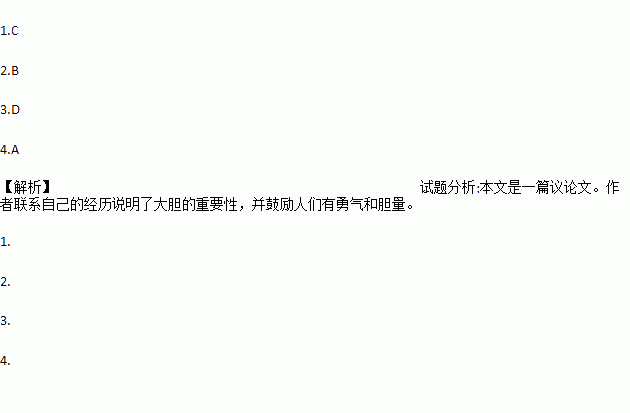题目内容
Once when I was facing a decision that involved high risk,I went to a friend.He looked at me for a moment,and then wrote a sentence containing the best advice I've ever had: Be bold and brave—and mighty(强大的)forces will come to your aid.
Those words made me see clearly that when I had fallen short in the past,it was seldom because I had tried and failed.It was usually because I had let fear of failure stop me from trying at all.On the other hand,whenever I had plunged into deep water,forced by courage or circumstance,I had always been able to swim until I got my feet on the ground again.
Boldness means a decision to bite off more than you can eat.And there is nothing mysterious about the mighty forces.They are potential powers we possess: energy,skill,sound judgment,creative ideas—even physical strength greater than most of us realize.
Admittedly,those mighty forces are spiritual ones.But they are more important than physical ones.A college classmate of mine,Tim,was an excellent football player,even though he weighed much less than the average player. "In one game I suddenly found myself confronting a huge player,who had nothing but me between him and our goal line," said Tim. "I was so frightened that I closed my eyes and desperately threw myself at that guy like a bullet—and stopped him cold."
Boldness—a willingness to extend yourself to the extreme—is not one that can be acquired overnight.But it can be taught to children and developed in adults.Confidence builds up.Surely,there will be setbacks(挫折)and disappointments in life; boldness in itself is no guarantee(保证)of success.But the person who tries to do something and fails is a lot better off than the person who tries to do nothing and succeeds.
So,always try to live a little bit beyond your abilities—and you'll find your abilities are greater than you ever dreamed.
1.Why was the author sometimes unable to reach his goal in the past?
A. He faced huge risks. B. He lacked mighty forces.
C. Fear prevented him from trying. D. Failure blocked his way to success.
2.What is the implied meaning of the underlined part?
A. Swallow more than you can digest. B. Act slightly above your abilities.
C. Develop more mysterious powers. D. Learn to make creative decisions.
3.What was especially important for Tim's successful defense in the football game?
A. His physical strength. B. His basic skill.
C. His real fear. D. His spiritual force.
4.What is the author's purpose in writing this passage?
A. To encourage people to be courageous.
B. To advise people to build up physical power.
C. To tell people the ways to guarantee success.
D. To recommend people to develop more abilities.
 小学课堂作业系列答案
小学课堂作业系列答案 金博士一点全通系列答案
金博士一点全通系列答案
